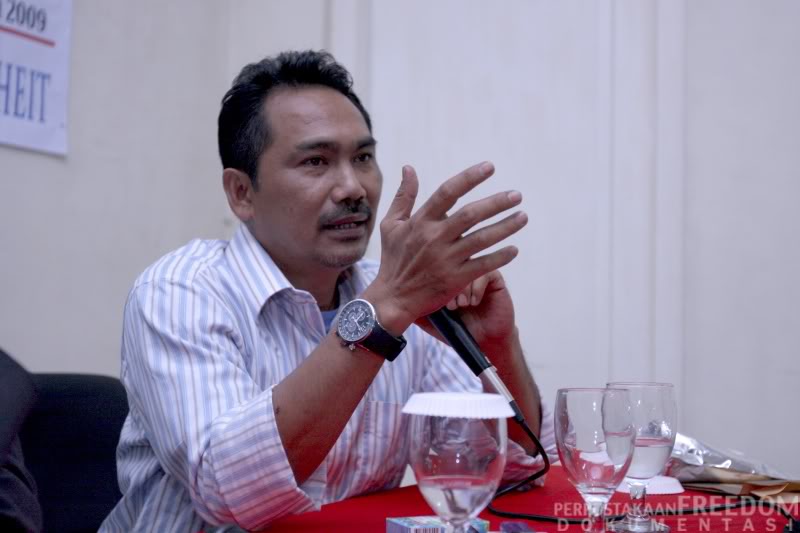
“There is always an opportunity behind every event,” noted Hamid Basyaib, as he opened the night’s discussion on the role of government in economic crisis (“Peran Negara dalam Krisis Kapitalisme”). Acting as the moderator, Hamid argued that crisis is a chance for the capitalist economy to become more efficient thru learning. At the same time, capitalism’s rival, communism, crumbles in the face of economic crisis and is unable to adapt to new challenges.
“There is always an opportunity behind every event,” noted Hamid Basyaib, as he opened the night’s discussion on the role of government in economic crisis (“Peran Negara dalam Krisis Kapitalisme”). Acting as the moderator, Hamid argued that crisis is a chance for the capitalist economy to become more efficient thru learning. At the same time, capitalism’s rival, communism, crumbles in the face of economic crisis and is unable to adapt to new challenges.
According to Hamid, the night’s discussion could be boiled down to two main questions. First is whether the government should step in during periods of crisis. One side prefers the government to have as minimal role as possible or even zero government intervention. The other side wants the government to help end the crisis through Keynesian economic policies .The second question centered on how governments could intervene effectively. Hamid ended by emphasizing the importance of these questions for the Indonesian government, since their decisions affect the welfare of 230 million people.
The first speaker was Poltak Hotradero, Head of Research for P.T. Recapital Securities. He began by showing the precipitous drop in global economic growth, evidence of the global recession. To further illustrate the point, Poltak used a table analogy; if the world economy is a table, then it is in a precarious state because three of its leg--US, EU, and Japan--are weak and the fourth leg--developing countries--shows signs of wobbling.
To combat the global recession, the US Federal Reserve, led by Ben Bernanke, is taking steps to slow the recession and improve the economy. Poltak detailed the steps of the recession; it started with a price drop, then was followed by companies failing to make profit, then was followed by layoffs. This downward spiral of the economy may eventually end in a total meltdown, which he argued might spark the rise of communism. In periods of recession, economic crises can quickly become political crises.
After explaining the numbers, Poltak went back to the relationship between economics and politics. He stated that free-market Capitalism is never absolute. Rather, there is always government intervention in one-way or another. One example is the printing of money, which only the state can do, and can thereby influence market dynamics. Another example is the government trying to avoid high unemployment, which the government fears more than market inefficient. After all, high unemployment can lead to instability in the nation. A prime example of such instability is the rise of Hitler in post WWI Germany.
During a recession, one of the first sectors in which governments intervene is finance. Even in the former communist countries of Russia and China, the government decided to pour billions of dollars into their ailing banks. But such interventions are not without dangers; Poltak reminds us that outright takeover of a bank by the government is not a good idea. Corruption thrives in nationalized banks, both domestic and international.
Another reason why governments intervene in the financial sector is that the private sector is much better than the state in creating jobs. Poltak then cited the case of the Indonesian government spending a large amount of money on the civil servants (Pegawai Negeri Sipil) program, yet creating a small number of jobs. He argues that a decentralized system would be more effective than a centralized one in creating jobs.
Poltak closed his speech by warning about another government intervention: public projects. Most of the times, public projects are completed in a short amount of time, thereby creating only temporary jobs rather than long-term work opportunities. Moreover, public projects are plagued by skill mismatch, for example, when migrant Chinese factory workers were put to work as road pavers.
Rizal Mallarangeng, the Executive Director of Freedom Institute, was the last speaker of the night. He opened his session by telling a story of his recent visit to Singapore, how the shopping paradise looked significantly slower than normal. During the economic crisis of the mid-late 90s, Singapore’s economy wasn’t damaged as much as other Asian countries because most of their economy is based on international trade, and the US and Europe did not suffer the same crisis as Asia. The opposite can be said right now. This is a “once in a hundred year” crisis and the worst part is that we still do not know when we will hit the bottom.
Going back in history, Rizal reminded us on how the great depression started spiraling down. It started when the government made a series of mistakes in tightening the money flow. The great depression happened from 1929 until 1939, around 10 years, while the current one is barely one year old. Yet the news is not all bad, Rizal noted, as we have economic knowledge on our side. With great research from the likes of Keynes and Hayek, it is hopeful that we can deal better with this crisis than we did in the 1920s.
As with Poltak, Rizal reiterates the importance of understanding the current situation before trying to find for an answer. After a quick recap on how the crisis started, he agreed with Poltak’s assumption that this crisis will be a long one. The question after that is what caused the crisis? While both the left and the right has different theories, most agree that one of the main causes is the under-regulating of the financial sector by the then current fed chair Greenspan. Rizal then continued by explaining that the collapse of the financial market was rooted in the collapse of the housing sector. Why did the housing sector collapse? Rizal argued that government intervention in the housing market—by giving our home loans to unprepared borrowers—led to the collapse.
On the subject of government role, Rizal argued that they should be more selective in their intervention. As an example, the large number of government owned corporations (BUMN) operating non-efficiently through government contracts, while other sectors that are supposed to be core to the state such as public services, security, and law enforcement are in tatters. He also spoke against monopoly by emphasizing the importance of competitive business practice to boost the quality of the products and services available for the people. In his closing statement, Rizal extolled the virtue of capitalism. In a capitalist system, everyone has the opportunity to move up the economic ladder. The children of house cleaner’s do not have to follow their parents’ path. Rather, with good education they can become a civil servant or a doctor.
Thomas Adam" 02/02/09



You must be logged in to post a comment.